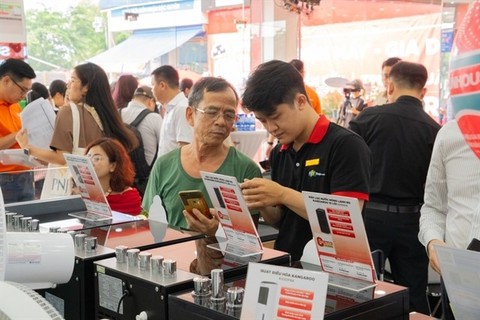
Consumers at an electronics store of FPT Shop. Despite the e-commerce boom, offline stores play an important role in the retail market. — Photo fptshop.com.vn
Major players in the retail market are reopening offline stores, offering hopes of recovery in consumption levels after difficult months in the first half of this year, which forced hundreds of stores to be shut down.
Early this month, FPT Shop opened ten electronics stores in HCM City and some other southern provinces, including Bình Dương, Đồng Nai and Tiền Giang, joining the electronics and home appliance retail market.
FPT Retail’s deputy director Nguyễn Việt Anh said that the retailer expected to increase the number of electronics stores to 50 by the end of 2024. The company decided to focus on electronics, which is expected to register high growth after the demand of phones and technology devices was forecast to slowdown in 2024.
The chairwoman of FPT Retail Phạm Bạch Diệp said electronics revenue still holds a modest share of below five per cent of FPT Shop, but this sector has a large opportunity for growth. The electronics business is expected to expand between 50-100 per cent this year, Điệp said.
Notably, FPT Shop participates in electronics retail after shutting down hundreds of computer and phone stores to optimise the system.
According to FPT Retail’s report on business results in the first half of this year, about a hundred FPT Shop computer and phone stores were closed in the second quarter alone.
As of the end of June, FPT Shop had 642 computer and phone stores across the country, with an average monthly revenue of VNĐ1.6 billion (US$63,700).
Retailer Bách Hoá Xanh regularly updated its fanpage with new store openings. In July, the retailer opened seven stores in HCM City and is expected to open another seven in HCM City, Long An, Bình Dương and Đồng Nai in August, much higher than the 2-3 new openings in May and June.
From 2022 to the beginning of this year, Bách Hoá Xanh did not open any new stores. The opening of new stores from the beginning of this year demonstrates the expectation of a recovery in consumer demand.
In its financial report in the first half, Bách Hoá Xanh earned a revenue of VNĐ19.4 trillion, up 42 per cent over the same period last year. The retail chain reported a profit of VNĐ7 billion for the first time since its participation in the retail market in 2015.
Bách Hoá Xanh expected to open 100 new stores this year to add to the 1,700 outlets it already has.
Meanwhile, some retail chains are narrowing down their presence.
Điện Máy Xanh, which sells electronics and home appliances, shut down 91 stores in the first half of this year to bring its total down to 2,0993 stores. Thế Giới Di Động closed 25 phone stores. An Khang reduced by 45 its 481 drug stores in the period.
WinCommerce, which operates Win and WinMart+, aims to have 10,000 stores on its books by 2030. The retail chain had 3,673 stores as of June.
WinCommerce expects that 80 per cent of stores will make a profit this year.
Potential market
With a population of around 100 million and improving incomes, Việt Nam has strong potential.
The retail market in Việt Nam expanded ten per cent in 2023 to reach VNĐ6.23 quadrillion and is forecast to expand at eight per cent per year.
Despite the e-commerce boom, offline stores play an important role in the retail market.
Ngọc Dung from Nielsen IQ said that Vietnamese people still prefer traditional shopping for fast-moving consumer goods, especially for food and beverages.
Offline stores will have to change their operating models and cannot be replaced. They also have an advantage over online stores in that they can work as a channel for brand recognition.
Dung also pointed out that consumers tend to reduce shopping at supermarkets and hypermarkets and increase spending at small-scale supermarkets and convenience stores.
According to a recent report by securities company VNDIRECT, the domestic consumption demand in the second half of this year will be promoted by the recovery of consumer confidence.
The Government’s demand stimulus policies, including a two percentage point reduction of value added tax to the end of this year, together with salary increases will also help improve purchasing power.
Đồng Bảo Toàn from consultancy firm Oracle NetSuit said that in the context of tightened spending, retailers need to optimise supply chains. The application of technology is important, he said, adding that strategies of multi-channel distribution is needed.
The locations of the stores, as well as promotional programmes, are also important for revenue.
With the rapid development of e-commerce, consumers will have more expectations over offline stores, forcing offline stores to, besides displaying and selling goods, become distribution centres, which help reduce costs and facilitate the shipping process, he said. — VNS